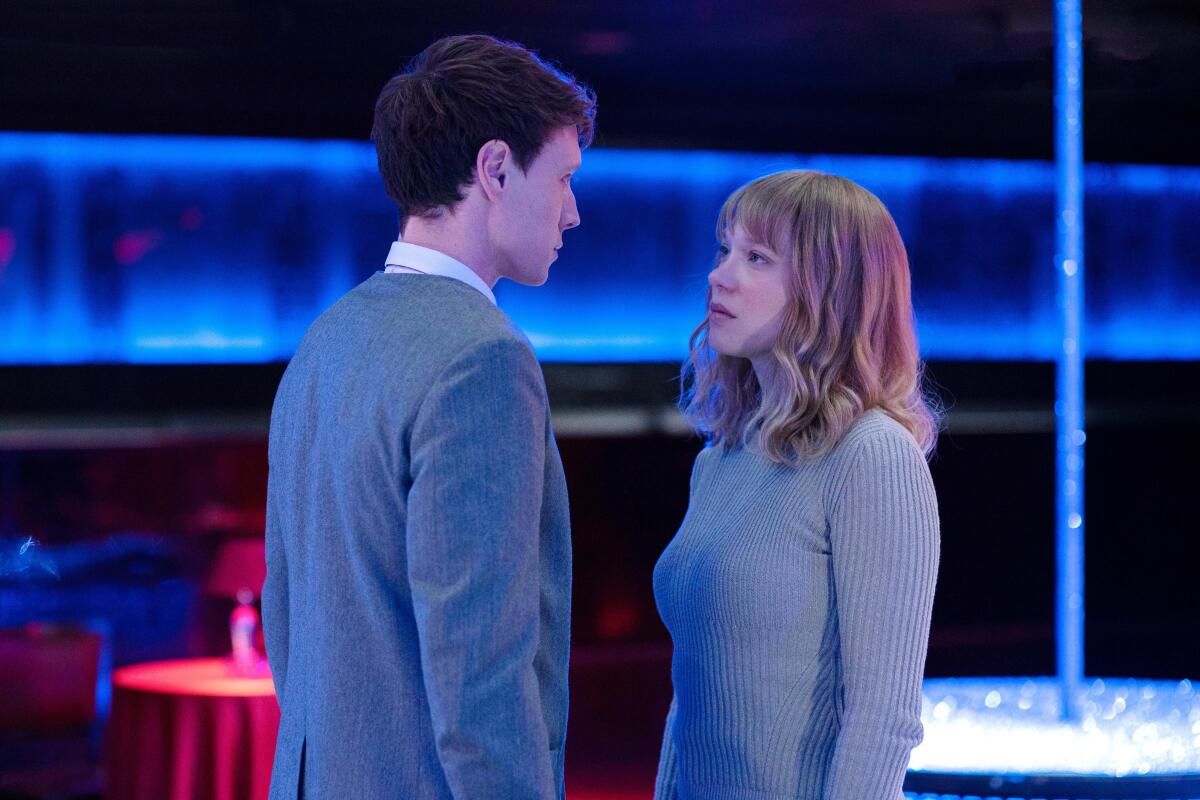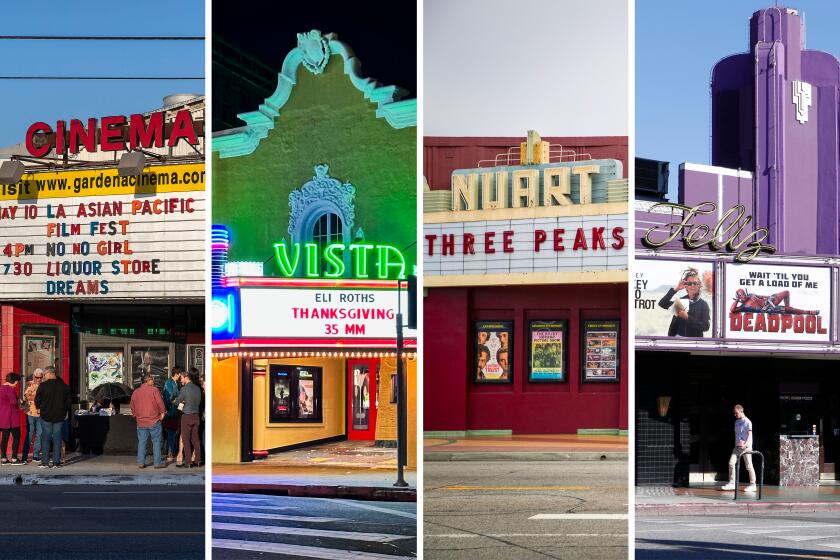Review: In ‘The Beast,’ two lovers can’t connect — and maybe AI is to blame

Whether it’s Charlie Chaplin literally trapped in the gears of industrialization in “Modern Times” or James Cameron crafting a gripping vision of robots enslaving us in “The Terminator,” audiences are consistently confronted by the threat of machines. But French writer-director Bertrand Bonello’s disquieting new film paints those anxieties in muted new colors, chronicling a love story that spans its characters’ past lives and future selves, condemning them to eternal discontent. “The Beast” may ostensibly be about artificial intelligence, but it’s really about the terror of being alive.
Loosely based on Henry James’ 1903 novella “The Beast in the Jungle,” “The Beast” encompasses three overlapping segments, all of them starring Léa Seydoux and George MacKay. The first episode, set in Paris in 1910, concerns Gabrielle (Seydoux), whose wealthy husband abandons her at high-society events where she meets Louis (MacKay), a charming Brit who reminds her that they had actually been introduced years earlier. Later iterations of Gabrielle and Louis will encounter each other in 2014 in Los Angeles and then in 2044 in a dystopian Paris, each time drawn to one another even if grim forebodings suggest their courtship will never last.
In films such as “Nocturama,” director Bonello examined individuals who seemed lobotomized by life, their futile actions a desperate attempt to bring meaning to meaninglessness. A similar sense of ennui permeates “The Beast” as the film provocatively opens with Bonello, off-camera, directing Seydoux in an eerily empty green-screen space, explaining to her what will appear in the frame in the final product. It’s a scene of utter artificiality commenting on the phoniness of our CGI-driven modern cinema, but this prologue also establishes the unease that coils through “The Beast,” the title a reference to the unspecified force that Gabrielle believes will eventually spell her doom.
That unease is amplified by the 2044 section, in which Gabrielle elects to have her feelings deleted — a common occurrence in the film’s dreary, AI-ruled future. Emphasizing drab minimalist architecture and subdued performances, Bonello critiques sci-fi tropes, but the earlier sequences are, themselves, riffs on familiar genres, with the 1910 segment a lush re-creation of costume romances and the 2014 episode morphing into an existential slasher film. Indeed, L.A.’s endless sunshine proves an ironic counterpoint to both Gabrielle’s failure to become a Hollywood star and Louis’ angry incel-fueled video diatribes directed at the women who won’t date him, his sights now set on Gabrielle. (Adding to the disturbing subtext, Bonello and MacKay incorporate real testimonials from Elliot Rodger, a misogynist who killed six people in Santa Barbara in 2014.)
We’ve mapped out 27 of the best movie theaters in L.A., from the TCL Chinese and the New Beverly to the Alamo Drafthouse and which AMC reigns in Burbank.
With its green-screen opening and unconventional end credits — you need to scan a QR code to see them — “The Beast” disdains our encroaching digital reality, but Bonello argues that the process of dehumanization occurs in myriad subtler ways. Whether it’s Gabrielle and Louis’ hopeless pining in Belle Époque Paris or the 2014 Louis’ dark obsession with Gabrielle, the filmmaker observes the daily circumstances that strip away our connection to one another — how we’re constantly denying our true feelings to avoid pain. The L.A. Louis is a monster created as a reaction to being rejected, while the 1910 Gabrielle too late realizes to whom she should have given her heart. When the characters in 2044 consider erasing their emotions, it’s merely the latest example of the soul-numbing activity in which they’ve always engaged.
The film’s Lynchian surrealism and time-jumping adventurousness, although occasionally hobbled by narrative digressions, are lifted up by the two leads. Seydoux, a Bonello veteran, is as wholly believable among the City of Lights’ upper class in 1910 as she is as a struggling actor a century later in the City of Angels. A melancholy of romantic disappointment hangs over the proceedings, and that poignancy is only accentuated by the fact that Bonello had originally intended Gaspard Ulliel (the star of the director’s “Saint Laurent”) to play Louis before the actor’s untimely death in 2022. MacKay had to learn French for the role — Bonello selected an English-speaking actor to avoid comparisons to Ulliel, to whom the film is dedicated — and the “1917” star shines in a part that requires considerable dexterity.
Indeed, the gentlemanly Louis of the first segment is nothing like the L.A. sequence’s sexist creep, two very different portraits of thwarted lovers. Is this menacing incel the beast come to devour Gabrielle? Or is the beast the ever-present danger of AI? Bonello leaves the question hanging, but this elegant, jittery drama ultimately proposes a troubling answer: Maybe there is no beast out there — maybe it’s our fear of feeling too deeply that dooms us. Gabrielle needn’t worry about her L.A. stalker or a dystopian future. Slowly but surely, we end up destroying ourselves.
'The Beast'
Not rated
In French and English, with English subtitles
Running time: 2 hours, 26 minutes
Playing: Opens Friday, April 5, at Landmark Theatres Sunset, West Los Angeles; AMC Burbank 16
More to Read
Only good movies
Get the Indie Focus newsletter, Mark Olsen's weekly guide to the world of cinema.
You may occasionally receive promotional content from the Los Angeles Times.









